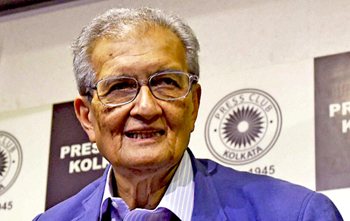New Delhi, Feb 20: Celebrated economist and Nobel Laureate Amartya Sen has declined a second term as Chancellor of the famous Nalanda University. The decision seems to be a political one, as Dr Sen feels that Narendra Modi-led BJP government does not want him to continue after his current term ends in July.
 Sen announced his decision to opt out of a second term through a letter to the University's Governing Board, even though the Board had unanimously voted to re-elect him on January 13.
Sen announced his decision to opt out of a second term through a letter to the University's Governing Board, even though the Board had unanimously voted to re-elect him on January 13.
But Sen had a stinging critique for the government, calling it out for its interference. He wrote that "...sad, at a more general level that academic governance in India remains so deeply vulnerable to opinions of the ruling government..."
Dr Sen writes that his decision to not continue in the post after July was after neither the President, Pranab Mukherjee, nor the Ministry of External Affairs (MEA) replied to the Board's decision. Because the Board consists of representatives of several Asian countries, the rules required the decision to be routed through the MEA to Rashtrapati Bhawan. Since he received no reply for a month, Sen concluded that the government did not want him to continue as Chancellor.
Sen however continued to lash out at the government, implying that President Mukherjee was under pressure. "Something makes it difficult - or impossible - for him to act with speed in this matter", wrote Sen.
Accusing the government of attempting to unilaterally reconstitute the entire Board, Dr Sen points out that, "the legal provisions (some of them from colonial days) allow the government to turn an academic issue into a matter of political dispensation."
Interestingly, Amartya Sen was a scathing critic of Narendra Modi during the latter's high profile Lok Sabha Election campaign.






Comments
Add new comment